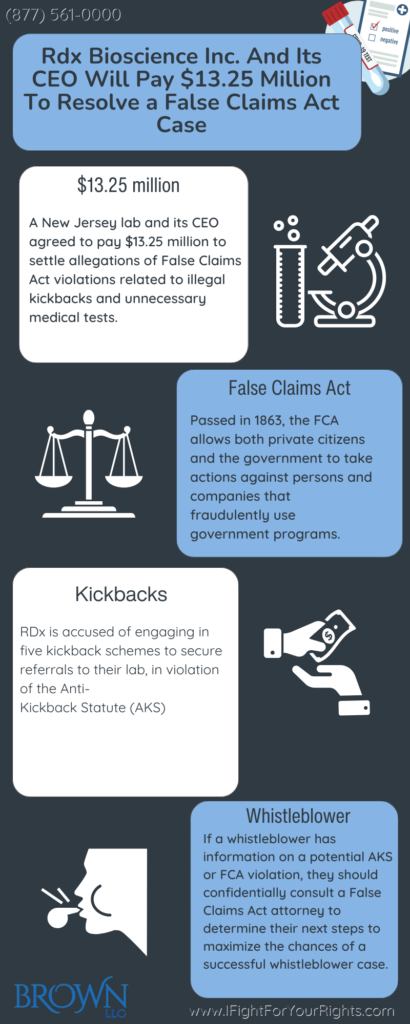RDx Bioscience Inc. and its CEO Will Pay $13.25 Million to Resolve a False Claims Act Case

A New Jersey laboratory and its owner and chief executive officer have agreed to pay $13.25 million to resolve allegations that it violated the False Claims Act by participating in illegal kickbacks and medically unnecessary laboratory testing. The settlement is a testament to the government’s consistent commitment to combating healthcare fraud with the False Claims Act, as well as a testament to the vital role of whistleblowers in reporting wrongdoing in conjunction with using a False Claims Act attorney.
What is The False Claims Act?
The False Claims Act is one of the nation’s oldest laws designed to prevent and address fraud against the government. Passed in 1863, the FCA allows both private citizens and the government to take actions against persons and companies that fraudulently use government programs. It does this via certain qui tam provisions, which allow private citizens, or “relators,” to file a complaint against a company or entity that is committing some sort of fraudulent wrongdoing. As relators are unable to file these cases pro se, or without an attorney, all relators must consult a False Claims Act attorney to have a successful case.
When a relator files a suit, it is done so confidentially “under seal,” and the relator remains anonymous until the case is unsealed, which may be many years after a case is settled. Upon receiving the complaint, the government has the option to intervene or not. If they do, the relator is entitled to up to 25% of the recovery. If not, the relator is entitled to up to 30% of the government’s recovery in the settlement. While the process may seem straightforward, it is of great benefit to both the relator and the government to have an experienced False Claims Act attorney aiding in the case to properly file documents, organize meetings, aid investigations, and work on bringing the case to a meaningful resolution if possible.
What are Kickbacks and The Anti-Kickback Statute?
Kickbacks are a form of remuneration in the healthcare industry, most commonly taking the form of benefits given to physicians in exchange for patient referrals to a medical service provider. As physicians are the face of the healthcare industry and usually the one person a patient speaks to, it is important that all patients can trust their physician to give them the treatment they deserve. With kickbacks in the mix, patients may not always be receiving the best care they need or deserve, and instead risk serving as a means for a physician to receive that unlawful benefit.
In an effort to combat kickbacks in the healthcare industry, the Anti-Kickback Statute (AKS) was passed in 1973 to prevent such fraud in Medicare and Medicaid programs. The AKS strictly prohibits kickbacks to induce referrals; while some industries may vary in their referral incentives, the AKS protects all patients covered by federal insurance providers. As many of these illegal kickbacks are connected to federal health care funding programs, the whistleblowers who report AKS violations may also be eligible to file an FCA case as well. Determining the difference is another important reason to consult a False Claims Act attorney when reporting such wrongdoing.
Speak with the Lawyers at Brown, LLC Today!
Over 100 million in judgments and settlements trials in state and federal courts. We fight for maximum damage and results.
The False Claims Act Allegations Against RDx
The District of New Jersey’s U.S. Attorney’s Office announced on January 10, 2024 that in response to the allegations it violated the False Claims Act, RDx Bioscience (RDx) and its owner and CEO have agreed to pay $10.32 million to the United States, and an additional $2.93 million to the state of New Jersey. As the Department of Justice investigates other participants in these alleged schemes, both RDx and its CEO have agreed to cooperate. Since the government intervened the individual who provided information may be eligible for up to 25% of what the government recovered or roughly a $3 million False Claims Act whistleblower reward.
RDx allegedly participated in five kinds of kickbacks that were paid to induce referrals to their laboratory:
- 2018 – 2022: RDx and CEO allegedly paid commissions based on the amount of Medicare and Medicaid referrals to arrange for and recommend ordering RDx laboratory tests
- 2018 – 2022: RDx marketer, Corumm Group allegedly disguised management services organization payments that were actually offered to providers to induce RDx laboratory tests
- 2017 – 2023: RDx marketers BeauMed Consultants, LLC and Ralston Health Group Inc. allegedly paid providers to induce orders for RDx laboratory tests, disguised as consulting and medical director fees.
- RDx allegedly paid collection fees to referring providers to induce orders for RDx laboratory tests.
Additionally, the government alleges that RDx was involved in false claims submitted to Medicare and Medicaid–either directly or indirectly–for unreasonable and unnecessary laboratory tests. These tests were not covered because they were either duplicates of other claims or ordered without individual consideration for the patients in a clinician’s practice.
Whistleblowing Under the False Claims Act
Reporting wrongdoing and misuse of federal funds is an important part of maintaining the integrity of the healthcare industry and other key industries in the United States. For whistleblowers that report wrongdoing under the False Claims Act, the potential to receive part of the recovery is another motivating factor in their reporting. Well placed whistleblowers and good information aren’t enough however, to maximize the chances of a recovery award. The most successful cases involve experienced False Claims Act law firms; these firms will have years of experience filing cases under the FCA and AKS, among other state and federal laws. Further, they may have close connections with the Department of Justice and other federal institutions that can help a case move along at each procedural step. In any case, if a whistleblower has information on a potential AKS or FCA violation, they should consult a False Claims Act attorney to determine their potential eligibility and next steps to maximize the chances of a successful case and settlement.

